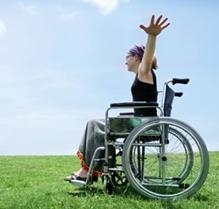UTSA Student Disability Services promotes equal access to all programs, activities
By Dianne Hengst
Director, Student Disability Services
http://www.utsa.edu/today/2013/09/disabilityservices.html (ขนาดไฟล์: 0 )
(Sept. 6, 2013) -- UTSA Student Disability Services (SDS) is a liaison between the university community and students needing academic accommodations. SDS promotes equal access to all university programs and activities by employing exemplary practices in disability counseling, assistive technology, alternative media, reasonable accommodations and the sharing of disability-related information.
Students must initiate the accommodation process with Student Disability Services, and staff members will help students develop a plan of support.
In contrast to services for students with disabilities in K-12, students in postsecondary education are not sought out and "identified" as needing accommodations. As young adults, students must "self-identify" as having a disability and provide Student Disability Services with supporting documentation.
UTSA Student Disability Services strives not only to be a support for students, but also a resource for UTSA faculty and staff and the San Antonio community.
>> For more information, call 210-458-4157 or email disability.services@utsa.edu. Like us on Facebook.
-------------------------------
About disabilities
• According to U.S. Census 2010, one in four people report they have some type of a disability.
• According to the 2008 National Postsecondary Student Aid Study (NPSAS), the proportion of students reporting a disability increased from 9 to 11 percent from 2000 to 2004.
• A report by the U.S. Government Accountability Office for the U.S. Department of Education (2009) indicates that the top three types of disabilities of students entering postsecondary education are psychological disabilities, attention deficit disorder and learning disabilities respectively.
Today, more and more high school students with disabilities plan to continue their education in postsecondary schools. As the result of federal legislation (Americans with Disabilities Act and Section 504 of the Rehabilitation Act), students with disabilities are protected from discrimination in postsecondary education. So, it is important for students with disabilities to stay informed about their rights and responsibilities.
ที่มา: http://www.utsa.edu/today/2013/09/disabilityservices.html (ขนาดไฟล์: 0
)
วันที่โพสต์: 1/10/2556 เวลา 03:37:11 
![]()
![]()
แสดงความคิดเห็น
รายละเอียดกระทู้
UTSA Student Disability Services promotes equal access to all programs, activities By Dianne Hengst Director, Student Disability Services http://www.utsa.edu/today/2013/09/disabilityservices.html (Sept. 6, 2013) -- UTSA Student Disability Services (SDS) is a liaison between the university community and students needing academic accommodations. SDS promotes equal access to all university programs and activities by employing exemplary practices in disability counseling, assistive technology, alternative media, reasonable accommodations and the sharing of disability-related information. Students must initiate the accommodation process with Student Disability Services, and staff members will help students develop a plan of support. In contrast to services for students with disabilities in K-12, students in postsecondary education are not sought out and "identified" as needing accommodations. As young adults, students must "self-identify" as having a disability and provide Student Disability Services with supporting documentation. UTSA Student Disability Services strives not only to be a support for students, but also a resource for UTSA faculty and staff and the San Antonio community. >> For more information, call 210-458-4157 or email disability.services@utsa.edu. Like us on Facebook. ------------------------------- About disabilities • According to U.S. Census 2010, one in four people report they have some type of a disability. • According to the 2008 National Postsecondary Student Aid Study (NPSAS), the proportion of students reporting a disability increased from 9 to 11 percent from 2000 to 2004. • A report by the U.S. Government Accountability Office for the U.S. Department of Education (2009) indicates that the top three types of disabilities of students entering postsecondary education are psychological disabilities, attention deficit disorder and learning disabilities respectively. Today, more and more high school students with disabilities plan to continue their education in postsecondary schools. As the result of federal legislation (Americans with Disabilities Act and Section 504 of the Rehabilitation Act), students with disabilities are protected from discrimination in postsecondary education. So, it is important for students with disabilities to stay informed about their rights and responsibilities.
จัดฟอร์แม็ตข้อความและมัลติมีเดีย
รายละเอียดการใส่ ลิงค์ รูปภาพ วิดีโอ เพลง (Soundcloud)


